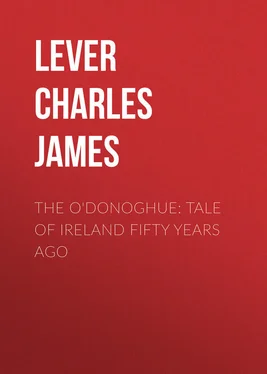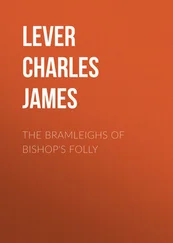Charles Lever - The O'Donoghue - Tale of Ireland Fifty Years Ago
Здесь есть возможность читать онлайн «Charles Lever - The O'Donoghue - Tale of Ireland Fifty Years Ago» — ознакомительный отрывок электронной книги совершенно бесплатно, а после прочтения отрывка купить полную версию. В некоторых случаях можно слушать аудио, скачать через торрент в формате fb2 и присутствует краткое содержание. Издательство: Иностранный паблик, Жанр: literature_19, foreign_antique, foreign_prose, на английском языке. Описание произведения, (предисловие) а так же отзывы посетителей доступны на портале библиотеки ЛибКат.
- Название:The O'Donoghue: Tale of Ireland Fifty Years Ago
- Автор:
- Издательство:Иностранный паблик
- Жанр:
- Год:неизвестен
- ISBN:нет данных
- Рейтинг книги:4 / 5. Голосов: 1
-
Избранное:Добавить в избранное
- Отзывы:
-
Ваша оценка:
- 80
- 1
- 2
- 3
- 4
- 5
The O'Donoghue: Tale of Ireland Fifty Years Ago: краткое содержание, описание и аннотация
Предлагаем к чтению аннотацию, описание, краткое содержание или предисловие (зависит от того, что написал сам автор книги «The O'Donoghue: Tale of Ireland Fifty Years Ago»). Если вы не нашли необходимую информацию о книге — напишите в комментариях, мы постараемся отыскать её.
The O'Donoghue: Tale of Ireland Fifty Years Ago — читать онлайн ознакомительный отрывок
Ниже представлен текст книги, разбитый по страницам. Система сохранения места последней прочитанной страницы, позволяет с удобством читать онлайн бесплатно книгу «The O'Donoghue: Tale of Ireland Fifty Years Ago», без необходимости каждый раз заново искать на чём Вы остановились. Поставьте закладку, и сможете в любой момент перейти на страницу, на которой закончили чтение.
Интервал:
Закладка:
When, therefore, one after another, the servants persisted in either openly accusing or insinuating suggestions against Terry, Sir Marmaduke became sorely puzzled. It was true, he himself had witnessed his conduct the night before; but if their version was correct, all his daring, energy, and boldness were so many proofs against him. He was, indeed, reluctant to think so badly of the poor fellow – but how discredit the evidence of his entire household? His butler had been in his service for years – and oh! what a claim for all the exercise of evil influence – for all the petty tyranny of the low-minded and the base-born – tracking its way through eaves-dropping, and insinuating its venom in moments of unguarded freedom. His footman too – but why go on? His daughter alone rejected the notion with indignation; but in her eager vindication of the poor fellow’s honour, her excitement militated against success – for age thus ever pronounces upon youth, and too readily confounds a high-spirited denunciation of wrong, with a mistaken, ill-directed enthusiasm. He listened, it is true, to all she said of Terry’s devotedness and courage – of his artless, simple nature – of his single-minded, gentle character; but by a fatal tendency, too frequent as we advance in years, the scales of doubt ever lean against, and not to the side favourable to human nature, and as he shook his head mournfully, he said —
“I wish I did not suspect him.”
“Send for him at least,” said his daughter, as with an effort she restrained the emotion that agitated her; “speak to him yourself.”
“To what end, my child, if he really is innocent?”
“Oh! yes, indeed – indeed he is,” she exclaimed, as the tears at length fell fast upon heir cheek.
“Well then, be it so,” said Sir Marmaduke, as he rung the bell, and ordered Terry to be sent for.
While Miss Travers sat with her head buried in her hands, her father paced slowly up and down the room; and so absorbed was he in his thoughts, that he had not noticed Terry, who had meanwhile entered the room, and now stood respectfully beside, the door. When the old man’s eyes did fall on him, he started back, with horror and astonishment. The poor fellow’s clothes were actually reduced to a mass of burned rags – one sleeve was completely gone, and, there, could be seen his bare arm scorched and blackened by the fire – a bandage of coarse linen wrapping the hand and fingers – a deep cut marked his brow – and his hair was still matted and clotted with the blood – awhile his face was of the colour of death itself.
“Can you doubt him now, father,” whispered the young girl, as she gazed on the poor fellow, whose wandering eyes roamed over the ornaments of the chamber, in total unconsciousness of himself and his sufferings.
“Well, Terry,” said Sir Marmaduke after a pause, “what account do you give of last night’s business?”
“That’s a picture of Keim-an-Eigh,” said Terry, as he fixed his large eyes, open to their widest extent, on a framed drawing on the wall. “There’s the Eagle’s Cliff, and that’s Murrow Waterfall – and there’s the lake – ay, and see if there isn’t a boat on it. Well, well, but it’s beautiful – one could walk up the shepherd’s path there, where the goat is – ay, there’s a fellow going up – musha, that’s me – I’m going over to Cubber-na-creena, by the short cut.”
“Tell me all you know of what happened last night, Terry,” repeated Sir Marmaduke.
“It was a great fire, devil a doubt of it,” said Terry, eagerly; “the blaze from the big stack was twice as high as the roof; but when I put the wet sail of the boat on it, it all went into black smoke; it nearly choked me.”
“How did it catch fire first, Terry? can you tell us that?”
“They put a piece of tindir in it; I gave them an ould rag, and they rubbed it over with powder, and set it burning.’
“Who were they that did this?”
“The fellows that threw me down – what fine pistols they had, with silver all over them! They said that they would not beat me at all, and they didn’t either. When I gave them the rag, they said, ‘Now, my lad, we’ll show you a fine fire;’ and, true for them, I never seen a grander.”
In this vague, rambling strain, did Terry reply to every question put to him, his thoughts ever travelling in one narrow circle. Who they were that fired the haggard, how many, and what kind of appearance they wore, he knew nothing of whatever; for in addition to his natural imbecility of mind, the shock of the adventure, and the fever of his wounds and bruises, had utterly routed the small remnant of understanding which usually served to guide him.
To one question only did his manner evince hesitation and doubt in the answer, and that was, when Sir Marmaduke asked him, how it happened that he should have been up at the Lodge at so late an hour, since the doors were all locked and barred a considerable time previous.
Terry’s face flushed scarlet at the question, and he made no reply; he stole a sharp, quick glance towards Miss Travers, beneath his eyelids, but as rapidly withdrew it again, when his colour grew deeper and deeper.
The old man marked the embarrassment, and all his suspicions were revived at once. “You must tell me this, Terry,” said he, in a voice of some impatience; “I insist upon knowing it.”
“Yes, Terry, speak it out freely; you can have no cause for concealment,” said Sybella, encouragingly.
“I’ll not tell it!” said he, after a pause of some seconds, during which he seemed to have been agitating within himself all the reasons on either side – “I’ll not tell it.”
“Come, sir,” said Sir Marmaduke angrily, “I must and will know this; your hesitation has a cause, and it shall be known.”
The boy started at the tones so unusual to his ears, and stared at the speaker in mute astonishment.
“I am not displeased with you, Terry – at least I shall not be, if you speak freely and openly to me. Now, then, answer my question – What brought you about the Lodge at so late an hour?”
“I’ll not tell,” said the youth resolutely.
“For shame, Terry,” said Sybella, in a low, soothing voice, as she drew near him; “how can you speak thus to my father. You would not have me displeased with you?”
The boy’s face grew pale as death, and his lips quivered with agitation, while his eyes, glazed with heavy tears, were turned downwards; still he never spoke a word.
“Well, what think you of him, now?” said Sir Marmaduke in a whisper to his daughter.
“That he is innocent – perfectly innocent,” replied she, triumphantly. “The poor fellow has his own reasons – shallow enough, doubtless – for his silence; but they have no spot or stain of guilt about them, Let me try if I cannot unfathom this business – I’ll go down to the boat-house.”
The generous girl delayed not a moment, but hastened from the room as she spoke, leaving Sir Marmaduke and Terry silently confronting each other. The moment of his daughter’s departure, Sir Marmaduke felt relieved from the interference her good opinion of Terry suggested, and, at once altering his whole demeanour, he walked close up to him, and said —
“I shall but give you one chance more, sir. Answer my question now, or never.”
“Never, then!” rejoined Terry, in a tone of open defiance.
The words, and the look by which they were accompanied, overcame the old man’s temper in a moment, and he said —
“I thought as much. I guessed how deeply gratitude had sunk in such a heart. Away! Let me see you no more.”
The boy turned his eyes from the speaker till they fell upon his own seared and burned limb, and the hand swathed in its rude bandage. That mute appeal was all he made, and then burst into a flood of tears. The old man turned away to hide his own emotions, and when he looked round, Terry was gone. The hall door lay open. He had passed out and gained the lawn – no sight of him could be seen.
Читать дальшеИнтервал:
Закладка:
Похожие книги на «The O'Donoghue: Tale of Ireland Fifty Years Ago»
Представляем Вашему вниманию похожие книги на «The O'Donoghue: Tale of Ireland Fifty Years Ago» списком для выбора. Мы отобрали схожую по названию и смыслу литературу в надежде предоставить читателям больше вариантов отыскать новые, интересные, ещё непрочитанные произведения.
Обсуждение, отзывы о книге «The O'Donoghue: Tale of Ireland Fifty Years Ago» и просто собственные мнения читателей. Оставьте ваши комментарии, напишите, что Вы думаете о произведении, его смысле или главных героях. Укажите что конкретно понравилось, а что нет, и почему Вы так считаете.












